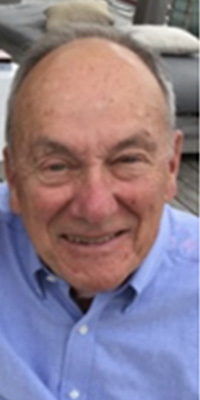In memoriam: Robert Metrione
Robert Michael Metrione died June 18 in Neptune, New Jersey, at age 88. He was a member of the American Society for Biochemistry and Molecular Biology for almost 50 years, and before his retirement, he served more than three decades as a professor of biochemistry at Thomas Jefferson University in Philadelphia.

Metrione was born in Livingston, New Jersey to Clara and Durand Metrione on August 22, 1933. He earned his bachelor’s degree at Bowling Green University, where he met his future wife, Mary Ann Luedeke. He went on to receive a doctorate at the University of Nebraska and held a postdoctoral fellowship at Yale University.
Metrione’s final research studies focused on DNA polymerase alpha, an enzyme complex that plays a role in launching DNA replication among eukaryotes. He also explored the inhibition of dipeptidyl aminopeptidase, an enzyme that aids in breaking proteins and peptides into their constituent amino acids.
Beyond his academic career, Metrione was known for his devotion to sharing jokes and silly faces with younger family members, slamming tennis balls, tending his community garden plot and crafting cavatelli, a kind of small pasta. He and his wife, Mary Ann, were both active in the local Horticultural Society.
Metrione’s wife, a teacher turned speech pathologist, died in August 2020. He is survived by his sister-in-law, Judy Gary and husband Bruce; sister-in-law, Arlene; children, Dan and Lori Metrione, Linda Lutz, Laura McBride, and Ellen and Brian Gibbons; and grandchildren, Hollie, Carly, Emily, Alec, Kelly, Brian and Maeve.
Enjoy reading ASBMB Today?
Become a member to receive the print edition four times a year and the digital edition monthly.
Learn moreGet the latest from ASBMB Today
Enter your email address, and we’ll send you a weekly email with recent articles, interviews and more.
Latest in People
People highlights or most popular articles

Finding a symphony among complex molecules
MOSAIC scholar Stanna Dorn uses total synthesis to recreate rare bacterial natural products with potential therapeutic applications.

Sketching, scribbling and scicomm
Graduate student Ari Paiz describes how her love of science and art blend to make her an effective science communicator.

Embrace your neurodivergence and flourish in college
This guide offers practical advice on setting yourself up for success — learn how to leverage campus resources, work with professors and embrace your strengths.

Survival tools for a neurodivergent brain in academia
Working in academia is hard, and being neurodivergent makes it harder. Here are a few tools that may help, from a Ph.D. student with ADHD.

Quieting the static: Building inclusive STEM classrooms
Christin Monroe, an assistant professor of chemistry at Landmark College, offers practical tips to help educators make their classrooms more accessible to neurodivergent scientists.

Hidden strengths of an autistic scientist
Navigating the world of scientific research as an autistic scientist comes with unique challenges —microaggressions, communication hurdles and the constant pressure to conform to social norms, postbaccalaureate student Taylor Stolberg writes.
